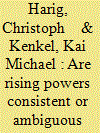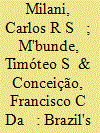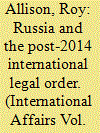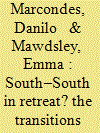|
|
|
Sort Order |
|
|
|
Items / Page
|
|
|
|
|
|
|
| Srl | Item |
| 1 |
ID:
153860


|
|
|
|
|
| Summary/Abstract |
This article illustrates how Brazil responded to the policy challenges its foreign policy activism posed for its engagement with a fundamental question of the international order: the tension between the protection of human rights and the prohibitions on intervention and the use of force. Leading the military component of the UN Stabilization Mission in Haiti (MINUSTAH) implicated accepting the mission's robust mandate that contradicted Brazil's traditional foreign policy positions. Notwithstanding this apparent contradiction, the country's diplomats also tried to shape UN debates on intervention norms, resulting inter alia in the ‘responsibility while protecting’ initiative. By analysing diplomatic efforts and military actions on the ground, we argue that since the watershed moment of becoming the most influential troop contributor to MINUSTAH, interests and actions of the armed forces increasingly contradict the efforts of Brazil's diplomatic establishment. The influence of Brazil's diplomacy in shaping intervention norms has proved to be rather elusive, compared with its military's palpable role in developing robust approaches for peacekeeping mandates revolving around the protection of civilians. Yet we argue that this apparent contradiction should not be seen as inconsistency. Instead, the case of Brazil shows typical signs of the ‘graduation dilemma’, in which both diplomats and military behaved in an eminently rational fashion.
|
|
|
|
|
|
|
|
|
|
|
|
|
|
|
|
| 2 |
ID:
153859


|
|
|
|
|
| Summary/Abstract |
Only in the mid-1990s did Brazil join the world-wide trend of states having diaspora engagement policies, and implemented specific programmes to address the needs and claims of its citizens abroad. In contrast to other Latin American countries, it did so following a low-visibility, technical approach led by consular offices, including very cautious attempts to organize emigrants and regulate their gradual access to migration policy-making. It also tied these outreach efforts to the building up of a global role in international affairs. This article analyses the politics and impact of these processes on foreign policy management, with special emphasis on the implications of these changes in terms of adapting policy instruments to a new notion of citizenship beyond borders and innovative techniques to manage populations abroad. It also investigates these issues in one major destination for Brazilians abroad: London, where Brazilians have lately become the largest Latin American community, but have faced serious obstacles to improving their resources for organization and mobilization. The findings suggest some discrepancies and tensions among officials' views and between policy design and actual results, thus illustrating a gap between foreign policy goals and implementation capacity at both the global and local levels. Thus, regarding the practice of foreign policy-making, the article provides novel information about recent institutional changes in state bureaucracies and the uncertainties and uneven impact of policy implementation. It also casts some doubts on Brazil's overall capacity to carry out a global strategy in this realm.
|
|
|
|
|
|
|
|
|
|
|
|
|
|
|
|
| 3 |
ID:
153861


|
|
|
|
|
| Summary/Abstract |
This article discusses how Brazilian foreign policy-makers addressed one of the key graduation dilemmas facing Brazil, i.e. the need to build domestic support for a shared vision within society for Brazil's role in the international arena. In the context of democratization, foreign policy-makers understood the importance of involving societal actors in developing foreign policy agendas and actions without hampering the coherence of diplomatic activity. Furthermore, in the context of the rising profile of Brazil in regional and global affairs, it became increasingly relevant to identify and appreciate the role of domestic influences and constraints on foreign policy-making. The article argues that the years the Workers' Party (PT) was in government (2003–2016) presented a watershed moment for foreign policy-makers' receptiveness to civil society inputs into foreign-policy debates. To do this, the article analyses how one crucial group of societal actors—business—organized to represent its interests on foreign economic policy, specifically trade policy, and how the Itamaraty (Ministry of External Relations) responded to business collective action. It examines business interactions with the Itamaraty in two phases, with the global financial crisis in 2008 roughly serving as the inflection point. It argues that the shift in the PT's foreign policy-making approach occurs due to three factors: changes in economic conditions, political leadership and societal interest representation. It concludes that the shifting policy preferences (both pragmatic and ideological) also changed the mix of societal influence on foreign policy.
|
|
|
|
|
|
|
|
|
|
|
|
|
|
|
|
| 4 |
ID:
153857


|
|
|
| 5 |
ID:
153858


|
|
|
|
|
| Summary/Abstract |
The main argument of this article is that second-tier, non-nuclear powers face a ‘graduation dilemma’ whenever their key decision-makers have the opportunity and the objective to choose between different international strategies: between a more autonomist type of development or a more dependent one; in security terms, between bandwagoning and balancing; when building a multilateral policy, between traditional alliances and innovative, flexible coalitions; in geopolitical terms and in the field of development cooperation, whether to emphasize North–South or South–South relations. These ideal binaries offer several other options which decision-makers may envision and implement. The concept of graduation dilemma that we propose has three main components that key decision-makers need to face: (a) the scope of their international ambition, the country's material capabilities and the systemic permissiveness; (b) the possible contradictions related to role expectations coming from international and domestic audiences; and (c) the uncertainty associated both with non-anticipated results and third countries' perceptions of their foreign policy decisions. Based on this conceptual framework, we examine the hypothesis that there is no consensus within the Brazilian strategic elite about the country's international strategy, particularly during the presidential mandates of Lula da Silva and Dilma Rousseff. The article is structured into three main parts: (1) the limits of the systemic change and power transition literature to explain second-tier non-nuclear states' ambitions and processes to redefine their international position; (2) the concept of graduation in our analytical framework; and (3) Brazil's graduation dilemma.
|
|
|
|
|
|
|
|
|
|
|
|
|
|
|
|
| 6 |
ID:
153862


|
|
|
|
|
| Summary/Abstract |
Brazil's engagement in international development cooperation (IDC) is not new; however, governmental funding and interest in this agenda have grown since the adoption of the 1988 constitution, particularly during the mandates of the two Workers' Party (PT) presidents. Brazil's IDC refers to a broad range of practices including educational, scientific, financial, humanitarian and technical cooperation; in this article, we focus on Brazil's educational cooperation. Theoretically, the main argument advanced is that Brazil's official engagement in IDC can be considered as an expression of a ‘graduation dilemma’, the main concept around which this special themed section of the journal is organized. Historically, this article focuses on the period between 2003 and 2014, beginning with Lula da Silva's inauguration in his first presidential mandate and ending in the last year of Dilma Rousseff's first mandate. Empirically, we deal with the following questions: what is Brazil's contribution in the field of international development cooperation (IDC), particularly in respect of educational cooperation (IDC/ED)? And what are the norms and criteria driving Brazil's decisions in this field? This article is divided into three main sections: first, an overview of Brazil's IDC; second, a discussion of Brazilian IDC in the field of education; and third, a review of Brazil's educational cooperation with Portuguese-speaking African (PALOP) countries.
|
|
|
|
|
|
|
|
|
|
|
|
|
|
|
|
| 7 |
ID:
153856


|
|
|
|
|
| Summary/Abstract |
Brazil attracted international attention in the early 2000s as a promising emerging market, a rising power with increasing international leverage, and a key player (potentially, a leader) in international organizations and blocs. High expectations were set in the largest Latin American country, partly encouraged by the popularity of the then president, ‘Lula’ da Silva, who fostered international activism and longstanding regional and global ambitions. At the same time, as Soares de Lima and Hirst argue,1 efforts both to acquire greater international influence and to improve the country's record on poverty, inequality and political participation became facets of the same process. International expectations remained very high at the beginning of the current decade. However, the global economic crisis, shortcomings in the multilateral system, the falling of global commodity prices, slow national economic growth, corruption scandals, and social protests during Dilma Rousseff's interrupted administration (2011–2016) have cast serious doubts on those initial very positive forecasts.2 To date, it is not clear whether Brazil has been able to reconcile domestic practice and international foreign policy discourse and ambitions in difficult times; or, more concretely, whether and how, despite domestic instability and contestation, Brazil is currently able to effectively influence international negotiations and global governance mechanisms.
|
|
|
|
|
|
|
|
|
|
|
|
|
|
|
|
| 8 |
ID:
153855


|
|
|
|
|
| Summary/Abstract |
Conventional narratives about the body of law regulating the conduct of armed conflict conclude that what was once known as the ‘law of war’ (LoW) or the ‘law of armed conflict’ (LOAC) can equally be called international humanitarian law (IHL) today. Yet how and why IHL came to be used as a name for this field is not explained. Understanding the evolution of IHL nomenclature is important because it reveals the background conditions which made possible the changes to the governance of the British armed forces already revealed in this journal (Forster, 88: 2, 2012), and it explains the frequent recourse to IHL invocations by non-governmental organizations in the midst of contemporary armed conflicts. Contrary to orthodox narratives, this article demonstrates that IHL's origins, contents and purpose are altogether different from those of LOAC/LoW. Nevertheless, the article reveals a concerted effort to rebrand LOAC/LoW as IHL—first led by the International Committee of the Red Cross (ICRC), and then taken up by human rights groups from the 1980s onwards. For the latter, a shift to IHL was about providing a means to expand their work into armed conflict scenarios; it was not about improving the law or making it more effective for its own sake. For these reasons, the article argues that the myth of IHL is that it is a body of law at all. Rather, it is a political project by and for international humanitarian and human rights organizations in support of their own political objectives.
|
|
|
|
|
|
|
|
|
|
|
|
|
|
|
|
| 9 |
ID:
153853


|
|
|
|
|
| Summary/Abstract |
Russia's annexation of Crimea and military intervention in eastern Ukraine, as well as Moscow's claims around these acts, challenge the post-Cold War territorial settlement and its underlying international legal principles. Unlike previous controversies over western-led interventions, a major power has used force to expand its territorial sphere. Russia's actions contradict its traditional focus on UN Charter principles and sovereignty in the wider international system. This article questions whether Russia has a serious agenda to gain support for revised understandings of international law, at least as applied to what it views as a Commonwealth of Independent States (CIS) region of entitlements. Or is Russia driven more by realpolitik, whereby legal discourse contributes to a strategic effort to force changes in the European territorial order, in the first instance in its direct neighbourhood? These uncertainties are contrasted to Russia's single-minded narrative on the threat of regime change. Moscow uses the spectre of ‘colour revolutions’ to influence a variety of states in the wider international system. Overall, so far Russia has failed to shift legal understandings in its favour over Crimea/Ukraine. Yet it continues to view the CIS states as only partly sovereign, as located in a zone of exception. Moscow seems intent on changing the European security and territorial order in its favour, regardless of the language of legal principles it deploys in its wider international diplomacy.
|
|
|
|
|
|
|
|
|
|
|
|
|
|
|
|
| 10 |
ID:
153863


|
|
|
|
|
| Summary/Abstract |
Over the past decade or so, Brazil has become an increasingly active and visible global development partner, especially in Lusophone Africa and in Latin America, as part of a foreign policy strategy aimed at diversifying relations and expanding the country's presence in the global South. However, the period of high profile growth of South–South cooperation (SSC) under President Luiz Inácio Lula da Silva (2003–2010) was followed by a period of contraction under President Dilma Rousseff (2011–16). Rousseff's lower interest in foreign policy and Brazil's domestic economic and political difficulties have been the two main reasons advanced to explain this shift. We concur, but in this article we seek to nuance this argument. First, we suggest that the ‘retreat’ from SSC was not as deep as sometimes assumed. Second, we identify legacies from the Lula era which left Brazilian development cooperation vulnerable to downturns. These are: (a) the difficulties in updating legislation and institutions to accommodate the expanded role of Brazilian development cooperation; (b) the difficulties in cultivating political and public constituencies; and (c) enduring inter-Ministerial fragmentation. In the penultimate section, we comment on the early indications of where the post-impeachment Temer Presidency will lead SSC.
|
|
|
|
|
|
|
|
|
|
|
|
|
|
|
|
| 11 |
ID:
153854


|
|
|
|
|
| Summary/Abstract |
Social media is increasingly used as a means of communication between states. Diplomats and political leaders are ever more relying on Twitter in their daily practice to communicate with their counterparts. These exchanges occur in view of a global audience, providing an added level of scrutiny that is unique to this form of communication. Twitter arguably challenges traditional notions of diplomacy according to which it is conducted through formal channels of communication and informal face-to-face social engagement. Yet we must ask how instrumental social media is as a tool for signalling intentions, and whether this medium can be an effective platform for dialogue and trust development when traditional face-to-face diplomacy is limited. Social media posts by state representatives reflect and frame state identity and how a state wishes to be recognized by others. If we are attuned to these dynamics, shifts in representational patterns communicated through social media during high-level negotiations allow realizations of political possibilities for change. Key here is the surprising nuclear deal between Iran and the P5+1 that analysts and policy-makers have struggled to explain. I argue that the role of Twitter as a key part of negotiation strategy is a crucial demonstration of how social media can shape the struggle for recognition, and thereby legitimize political possibilities for change. Understanding the increasingly prominent and powerful, yet largely unknown, variable of social media as a tool of diplomatic practice provides insight into the recurrent question of how diplomats affect change beyond upholding the status quo in the international order.
|
|
|
|
|
|
|
|
|
|
|
|
|
|
|
|
|
|
|
|
|